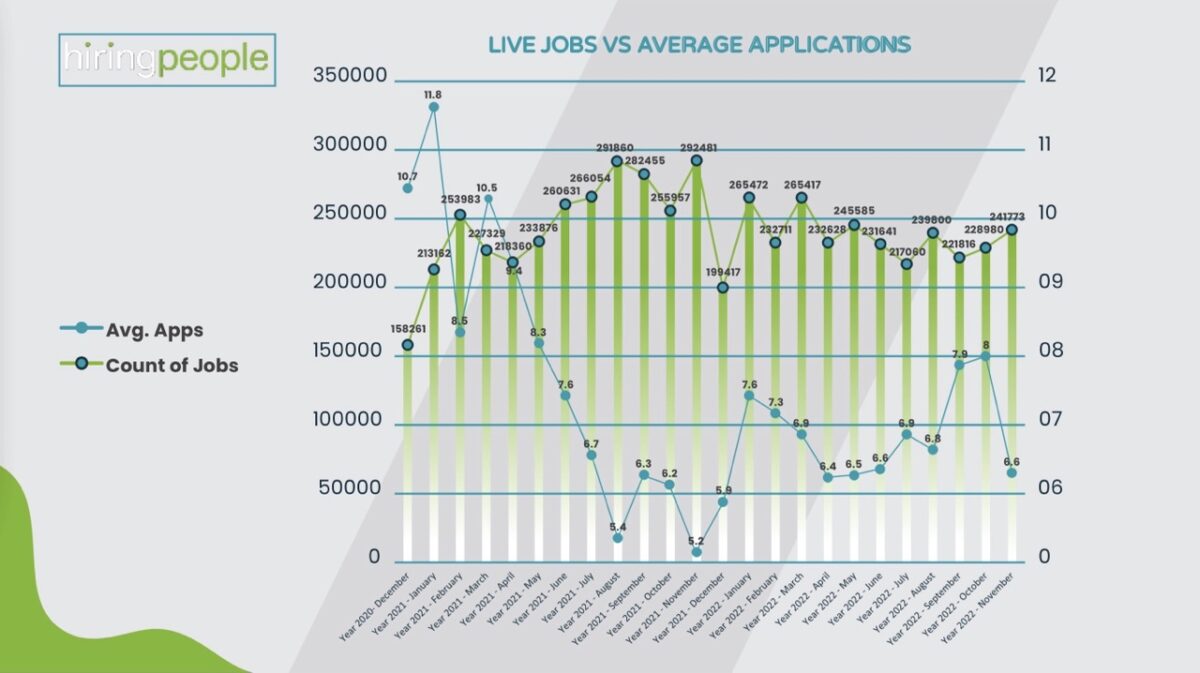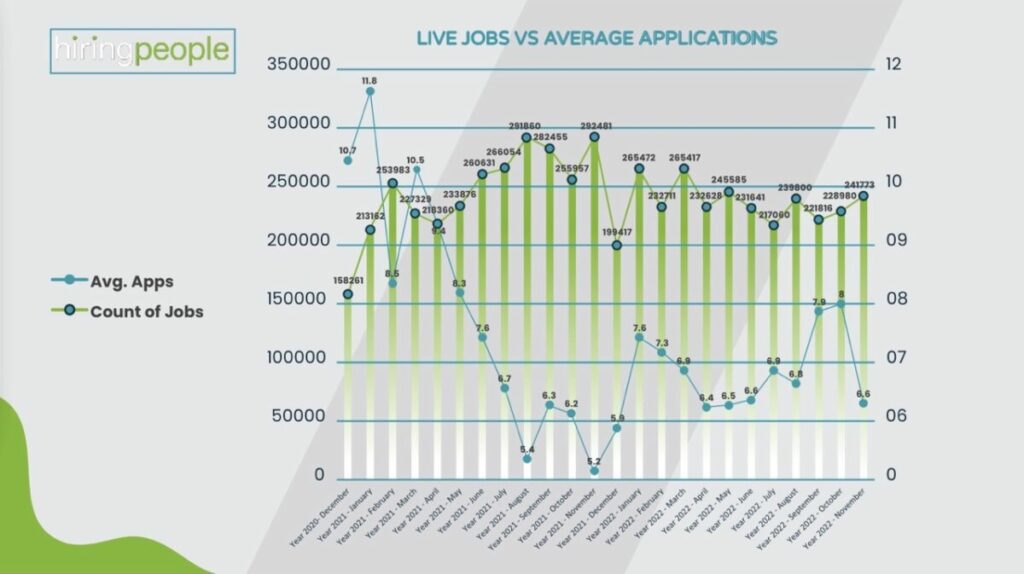Should You Advertise Jobs In December

Summary:
This article discusses recruitment data for the past 24 months to reveal whether you should advertise jobs in December, which in itself tells us a lot! In addition to revealing whether you should advertise jobs in December, we look ahead to the recruitment trends for 2023.
Key takeaways:
- Job applications per live job do not decline much in December.
- Companies should pre-schedule job adverts for December 29th.
Counter arguments:
- Companies must avoid candidate’s red flags and focus on strategies that get candidates to commit.
Outline:
- Introduction
- Current Recruitment Challenges
- Recruitment Trends – Past 24 Months
- Most Popular Job Search Phrases – 2022
- Specific Job Titles That Receive More Searches
- What Are Job Seekers Looking For In A Job?
- What Are The Red Flags For Job Seekers?
- How To Manage Too Many CVs
- How To Get Candidates To Commit
- Recruitment Trends For 2023
Introduction
December is a busy time for many things, such as Christmas shopping and socialising with friends, family, and work colleagues. But is December a good time to advertise jobs? Furthermore, what has been happening in recruitment during the past two years? And what will be the recruitment trends for 2023?
We have collected the data and completed the research to answer these questions and more.
Current Recruitment Challenges
Business owners, HR teams, and recruiters have several recruitment challenges to overcome. The first issue is not receiving enough good job applications and too many poor ones.
Having an inbox loaded with CVs has a knock-on effect on businesses because they do not have enough time to review an almost endless number of CVs. The next challenge in recruitment is getting candidates to commit and show up for job interviews.
Recruitment Trends – Past 24 Months

During the past 24 months, jobs advertised peaked in November 2021, eventually declining and holding relatively steady until November 2022. Job applications peaked in January 2021, with a rapid decrease during the next eight months. Afterwards, job applications steadily increased, averaging between 6.5 and 8 applications per advertised job.
What about December recruitment trends? The data shows that December is busier than you might expect and an underutilised month. While the jobs advertised are at their lowest for the year, average applications do not drop off.
With fewer live jobs and no drop-off in applications, there is less competition for staff and job seekers, particularly between Christmas and New Year. Furthermore, New Year onwards is significantly more active, so companies should advertise in December and could pre-schedule job adverts to go out on December 29th.
Most Popular Job Search Phrases – 2022
The most commonly searched terms during 2022 highlight the current candidate mindset:
- Work from home: 1.4m
- Warehouse: 719k
- Immediate start: 660k
- Administration or admin: 624k
- Accountant: 544k
- Administration: 537k
- Administrator: 536k
- Finance: 520k
- Manager: 479k
- Remote: 456k
Specific Job Titles That Receive More Searches
Our data shows that different job titles receive vastly different search volumes. Therefore, choosing the right title can significantly increase the visibility of your job. For example:
- Customer Service Advisor receives 114k more searches than Customer Service Executive
- Marketing Executive receives 49k more searches than Marketing Administrator
- Sales Executive receives 33k more searches than Sales Consultant
- Internal Sales receives 5k more searches than Telesales Executive
What Are Job Seekers Looking For In A Job?
Our analysis shows that job adverts that include the salary receive 37% more applications. Furthermore, 36% of job seekers say benefits are a deciding factor when choosing a job.
Job adverts and job descriptions must build a clear picture of the business, the role, and the perks to enable prospective candidates to determine if it is a place they would love to work.
What Are The Red Flags For Job Seekers?
It is easy to unintentionally slip a red flag into your job advert and put candidates off before they ever apply. We recommend checking for red flags before you submit your ad.
The top 10 red flags for job seekers include the following:
- No specified salary range: 65%
- Low base salary: 60%
- Experience requirement too high for the position: 50%
- “Pay commensurate with experience”: 49%
- Grammar and spelling mistakes: 48%
- Long list of job qualifications: 43%
- No mention of paid time off: 36%
- No mention of paid sick leave: 36%
- Mention of occasional weekend work: 33%
- Too many interview rounds: 33%
How To Manage Too Many CVs
Too many CVs are a problem for many business owners and HR professionals. To prevent or manage this issue, you could use language that discourages irrelevant applications and the deselection methodology available in Applicant Tracking Software.
How To Get Candidates To Commit
Second chances are rare, so it is essential to follow good recruiting practices. To ensure candidates commit and provide a positive candidate journey, we recommend the following:
- Creating an engaging and accurate job advert
- Avoiding the red flags
- Using commonly searched phrases and job titles
- Focusing on what you can offer
- Engaging candidates quickly
- Using a simple application process
Recruitment Trends For 2023
We expect to see the following five recruitment trends in 2023:
- Career mobility and upskilling will be a top employer priority
- Employers will enhance benefits to give employees a financial boost
- Businesses will focus on optimising hybrid and remote working models
- Ghosting and labour hoarding
- Pay transparency becomes the new normal
Recruitment FAQs
Here we answer your recruitment questions.
The current economic uncertainty indicates that the job market will loosen. However, employers must continue to attract and engage candidates, focusing on skills, pay, remote working, and belonging.



